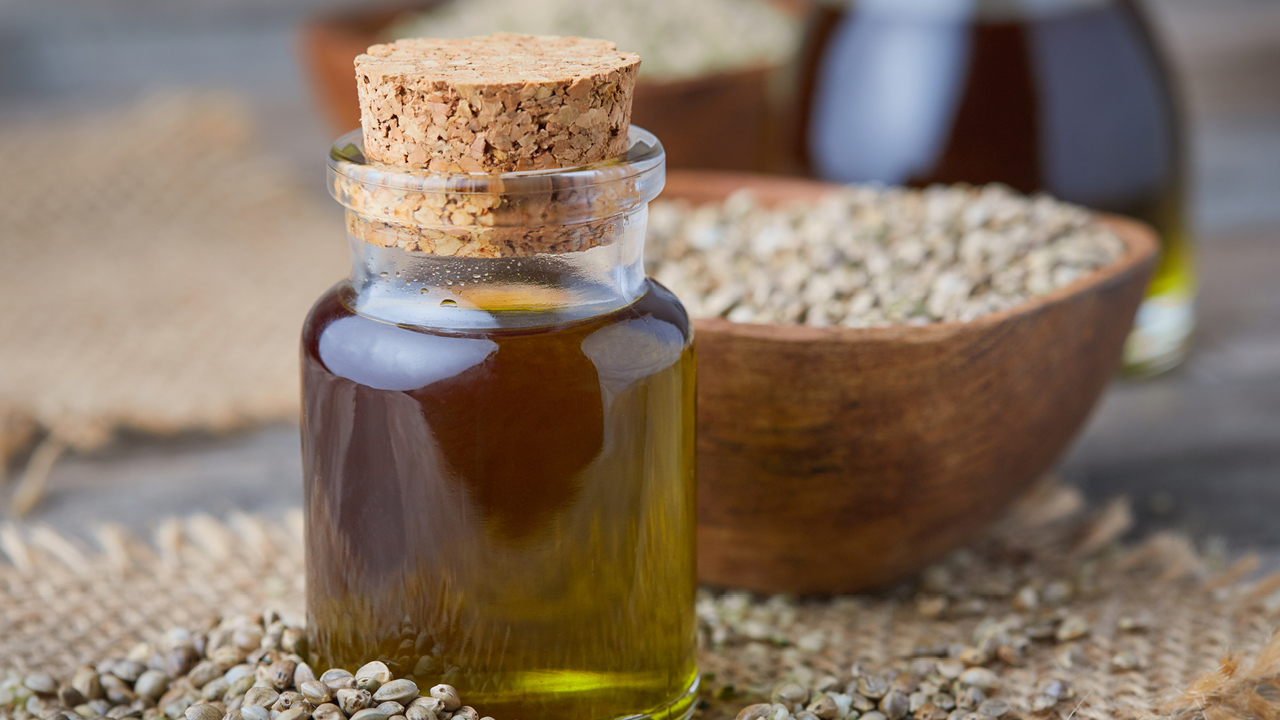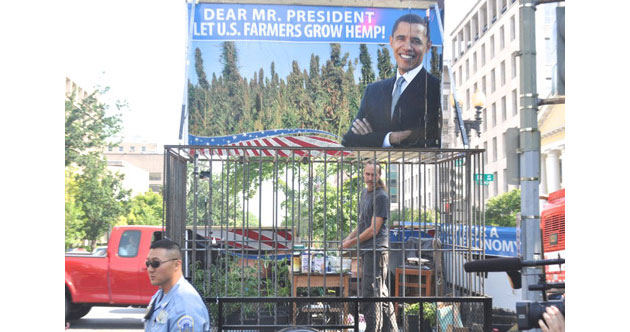
My brother, David Bronner, who is also CEO of Dr. Bronner’s, was arrested in 2012 during an act of civil disobedience. He was protesting then-President Obama’s refusal to acknowledge that industrial hemp is not a drug, does not contain substantive amounts of THC, and should not be under regulation as a Schedule I controlled substance. David exemplifies the wisdom of Henry David Thoreau’s words, “Under a government which imprisons unjustly, the true place for a just man is also a prison.”
David locked himself in a steel cage in front of the White House with mature hemp plants, whose THC content was lab-certified to be <0.3% THC. Nonetheless, their very presence in the U.S. is illegal. He proceeded to press the oil out of the seeds (also illegal to have non-sterilized seeds in the U.S.) and serve it on bread to passersby.
Read more from the Washington Post’s article and video.

Historically, industrial hemp showed up at the wrong party. Its only crime is to be related to the THC rich drug varieties of Cannabis. If I were judged for the characteristics of my cousins, who knows where I’d be? (This is only rhetorical – my cousins are fabulous.) Yes, granted, we’re talking about plants here, not people. Very true, but these plants affect human lives tremendously. According to current drug code interpretation, people who grow and process industrial hemp in America (even my brother in front of the White House) are being herded into the same jail cell as people who grow marijuana. And they don’t even get high. We are talking about people here.
Perhaps all this seems like a big hassle. After all, it’s just a plant. There are other plants. But industrial hemp – which encompasses both the oilseed and fiber varieties of Cannabis sativa is a key in resolving many problems facing America today. From an economic standpoint, consider that the United States is the number one importer of hemp products in the world. Wouldn’t it be nice for that money to stay in America? From an environmental standpoint, hemp grows quickly and thickly, seldom requiring pesticides, thereby reducing pollution from run-off. Furthermore, industrial hemp’s versatility makes it an excellent option for diminishing or replacing other crops that consume time, space and resources. The hemp fiber can be used for paper and building materials reducing the demand on trees. Hemp and hemp blend fabrics reduce the consumption of cotton, a time, labor, and chemical thirsty crop. Hemp plastics can reduce the use of petrochemicals. Hemp seed (which is very high in healthy Omega-3 fatty acids, SDA and GLA, as well as B-vitamins and is a nearly complete protein) can contribute to the health of people, livestock and other animals. This crop, and the variety of markets for it, would be a great boon to American farmers. Instead of inventing uses and markets for the overabundance of corn that we currently have on our hands, we would have a truly helpful product.
But beyond these practical aspects, the issue of legalizing hemp begs the question of whether we value scientific research in America. Should we ban something based on fear and ignorance? Certified industrial hemp varieties have a THC content of less than 0.3%. Marijuana has a THC content of 2% to 20% on average. A person can’t get high and won’t register positive on a drug test from the concentration in the hemp. We’ve already been through this with poppy seeds.
This is also not new technology. Hemp cultivation dates back millenia. It has been used in ancient building materials, in ropes and sails on ships, for food, paper, and cloth, and internationally today, is widely used for all these purposes and more. Henry Ford used hemp in the production of automobiles (as do Mercedes and BMW today), and said, “Why use up the forests which were centuries in the making and the mines which required ages to lay down, if we can get the equivalent of forest and mineral products in the annual growth of the hemp fields?”
The only argument voiced by legislators for keeping industrial hemp in lockdown is that U.S. Drug Enforcement Officers wouldn’t be able to differentiate between the two. I’ll object on their behalf to this disparagement of their intelligence and discernment. I am going to give them benefit of the doubt, and trust that they are thinking individuals, able to learn that industrial hemp (the oilseed and fiber varieties of Cannabis sativa) is an agricultural crop (literally, “field cultivation”). The oilseed plants are short, with big seed heads that are easily combined and the fiber plants are quite tall, and are grown very close together. Recreational marijuana (drug strains of Cannabis sativa and Cannabis indica) is a horticultural crop (literally, “garden cultivation”) that is grown for its flowering tops, both seeded and unseeded (sinsemilla). Most grown indoors are seedless.
There’s also the argument that the shorter THC potent strain could hide in a field of the taller relative. However, that argument could then be taken to its logical extreme that any plant over 6 feet tall could be used to hide drug cannabis – Bamboo? Corn? Pine trees? That’s just silly. Furthermore, the THC levels of the drug strains would be lowered by cross-pollinating with the low-THC hemp varieties and the plants would become seeded. Any saved seeds from this breeding would also be lower in THC. The difference would be clear from the air as drug strains are grown much farther apart and are carefully tended, so paths into the field would be obvious. It wouldn’t be a good technique.
People on both sides of the debate often mucky the issue by their refusal to acknowledge the dissimilarity between the varieties of Cannabis. Unending jokes made about getting high from hemp and hemp products only serve to add unwarranted fuel to the opposition, who don’t want this to be the segue to legalization of recreational marijuana. These two legalization campaigns focus upon completely different issues and merit completely different arguments.
Last week, Sen. Ron Wyden, (D) Oregon, introduced a hemp farming amendment (S.A.2220) to the Farm Bill (S.3240) the Agricultural reauthorization bill, that clarifies that industrial hemp is an “agricultural crop” that should not be considered the same as “marijuana.” This amendment will allow farmers in the U.S. to have the opportunity to grow industrial hemp under state regulation. Sen. Rand Paul, (R) Kentucky, is an original co-sponsor. This amendment needs the support of your Senator.
I know there’s a lot to care about in this world, and here I’m asking you to care about one more thing. This issue is a bit removed from the day to day topics of green living I usually focus on, but it’s good to see how we are all part of something greater than ourselves. Also, the success of this issue comes primarily through grassroots action, and not from top down politics. Personally, this does mean a whole lot to me and Dr. Bronner’s because the soaps contain hemp oil, which is sourced from Canada. But beyond that it means a lot to me and to Dr. Bronner’s and to David because in principle, it’s wrong to act on misinformation, especially to the extent of imprisoning people who are acting on the correct information. Caring about this information, once again, is about full disclosure and bringing information into the light. Please take a moment to care about this issue, and pursue the above link.
Good resources on industrial hemp:
Note: Thank you to all the readers who helped me clarify my initial oversimplification of the differences between industrial hemp and the recreational drug.








What is benefit of using hemp in soaps?
Hi Elizabeth – I’m so glad you asked! Check out my post “9 Ways to Use Hemp Oil in Body Care (And Why You’d Want To)”
I do believe that hemp used to be a mandatory crop in the US and I think it was in 1937 that it was banned because of the whole marijuana “scare”. It has been documented that cannabis oil can cure cancer and many other afflictions which is probably one of the reasons why it was criminalized: the government couldn’t make enough money off of it, big pharma would take a huge hit, and there wouldn’t be billions spent on cancer and other treatments. Factor in all the other industries that would suffer (logging, steel, cotton, oil and gas, etc. etc. etc.), and God’s little weed is no longer available to the masses. Follow the money.
I’m a Republican and I would support it. I don’t understand why people think Republicans are so uptight. We are for free trade, free business and lower government regulation (not to be confused with NO government regulation). Granted, I don’t know a thing about hemp vs. cannabis or whatever. I just know that if it’s something that can be marketed that won’t hurt someone, Republicans will be all over that. Republicans want to employ everyone and they want people to work. Something like hemp would create those jobs and they’d love it.
Good for your brother for standing up for what he believes in. It’s too bad more of us can’t be more involved like that.
I’m a Republican as well, and I agree whole-heartedly with everything magnoliasouth said… Sorry I’m late to this, better late than never though, I suppose!
Quick update – The debate rages on. U.S. Representative Thomas Massie (R-KY) introduced a bipartisan “Industrial Hemp Farming Act of 2013”. Read more about it here: http://www.votehemp.com/federal.html. Encourage your representatives to support this important legislation.
All the best,
Lisa
Hi Everyone – Thank you for supporting this important issue. There is a lot of mis-information, assumptions, and prejudice out there. I encourage everyone to educate themselves as much as possible, so that all proponents for the legalization of the growth of industrial hemp are pulling in the same direction. To re-emphasize, both industrial hemp and recreational marijuana are cannabis, so be sure to use other terms to differentiate between them.
And, yes, I agree that the lobbies for crops that hemp could cut into (such as cotton, timber, and petroleum) definitely are interested in seeing this action defeated. As would companies who provide pesticides and GMO’s since at the moment, hemp can be profitably grown without both. The debate is not solely about drugs.
To clear up a very common misconception (I, too, was mistaken about this), the U.S. Constitution and Declaration of Independence are written on parchment. However, drafts were written on hemp paper.
And lastly, do not give up on the hope of having Republican support for this amendment. Sen. Rand Paul (sponsor of the amendment) is Republican, though Libertarian, and there are many aspects of the pro-industrial hemp argument that would appeal to more conservative politicians. (It’s a great boon to farmers; it calls for less government intervention; it emphasizes states’ rights; it would boost job creation; and it would reduce our trade deficit) Don’t dismiss the possibility of swaying conservatives. Look for the arguments that are of higher priority to them.
Rep. Ron Paul has also introduced a bill to Senate that has some Republican backing as well. You can track that one here: http://www.govtrack.us/congress/bills/112/hr1831.
Keep spreading the word! The success of this effort is highly dependent on word of mouth education and momentum.
All the best,
Lisa
Thank you for all you’ve done to help free hemp and heal the world. As the co-author of a novel called “Hemp,” your cause is mine. If there’s anything I can do to assist you – writing, editing or mundane chores – I’d be honored! And if you’d like to read “Hemp” – it’s an expose’ on the criminalization of hemp interwoven in a love story – I’d be delighted to send you a copy, e-book or soft cover. All the Best, Nini Martino (pen name)
So, by that logic, the original U.S. Constitution manuscript should be destroyed as a potential high? Wasn’t it written on Hemp paper? It’s ludicrous. It’s about competition for the current industries, like corn oil, pulp and fiber, and we don’t want that, now do we? That would be un-American, or should I say, Un-Republican.
Too bad I live in Georgia. I can’t see my two Republican Senators and Republican Represenatative knocking themselves over to support legislation from an Oregon Democrat to legalize marijuana (as they would characterize it). Even though it would be an economic boon and benefit our economy, as I said, they’re all Republicans. 🙁
Lisa thank you for this well articulated information. It is so clear that our anti-hemp stance is a product of big money competitors and bad policy perpetuated by irrational fear. I am so proud of your brother for taking this stance and truly making a mockery of this ridiculous prohibition. The farther this goes through the courts the better, hopefully the issue gets somewhere where the decision will make a lasting change.
Hi Lisa, we have a guy around here who found a cure for cancer with the Inca plant. He planted and made the medicine himself and gave it free to help cure cancer for many people in his community after a few years Canadian RCMP cough him and he went in front of a judge and he went in prison for 4 weeks. After the prison he started again planting the Inca Plant and continued to make the medicine but in 2009 he went for a trip in Europe and the RCMP came back to raid his place and told his son that his father is back from europe he will be put back in prison. This guy his still in europe right now and can not come back in Canada. MAke a search on Google for Rick Simpson. Imagine a cure for cancer with a 100% natural plant. Thisplant is not man made it’s god creation. Continue your good work Lisa and the Bronner family for the great soap.
I do not think this is about a possible high or hiding the growing of Marjuana. I think it is all about Timber,Oil,Cotton and other industries that will lose out. They lobby heavily againist Hemp.
So glad I’m Canadian! We use hemp oil every morning in our smoothies; I make skin care bars with hemp oil, I’m wearing a hemp t-shirt right now! It’s a great crop for our Northern climate! Do you think the cotton lobby, the corn lobby etc etc has anything to do with the resistance to hemp in America?
Thank you for posting Lisa. And I thank David for speaking out and setting up such a great protest. I imagine once Monsanto develops a genetically modified, round-up ready patentable hemp, then our corporatocracy will have no problem changing the laws to allow it to be grown here in the U.S.
I applaud and salute David for his bold action and sacrifice.
I must add, however, that cannabis is a much safer and healthier alternative to alcohol for applications such as stress relief, meditation, and introspection. And to suggest that cannabis has no medicinal value (schedule I) is patently absurd.
They are already hiding marijuana stands in taller crops. They have been found hidden in National Forests, in personal stands of “Christmas Trees”, and in other taller crops. So yeah, that is an active and occurring issue. But aerial observation shows it – the crop colors and textures are different. I suspect that hemp and marijuana would have different crop colors, and would be easy to spot from the air. Simple solution is to make it a registered crop, subject to random USDA inspection.
Very well said, Lisa. I just don’t understand the government’s reasoning on the industrial hemp issue (actually, I don’t “get” a good deal of the government’s reasoning, but that’s a topic for another day). Industrial hemp could be a vital/profitable U.S. crop and a tremendous boost to the economy.
I used to own a tanning salon and sold lotions with “hemp”…some folks wouldn’t even try a sample for fear they would get “high” or show positive on a THC test. Really? I think it boils down to the fear of the unknown. Educate America, and you can change the perception of industrial hemp.
Wishing your brother good luck, Tina
P.S. I am retired law enforcement and by no means do I encourage or promote illegal marijuana use. In my opinion, marijuana is illegal and should remain so unless used under the STRICT supervision of a doctor for medicinal purposes only.
I agree,it is ridiculous how our country steps backwards at times. It’s such a versatile crop.
“The only argument voiced by legislators for keeping industrial hemp in lockdown is that U.S. Drug Enforcement Officers wouldn’t be able to differentiate between the two.”
I propose a simple test for cops – have them distinguish between hemp and pot. Those who can’t tell the difference after being trained are fired for being incompetent.
Congratulations/admirations to David Bronner, the man has solid hemp balls!
This country used to be great, now we’re the laughing stock for the rest of the world. Such absurd and illogical laws enforced on “the land of the free”. Our country’s founding fathers were Free Thinkers and supported knowledge, science, and hard work for the benefit of the people and for the people. Now we just bicker, watch tv, and belly ache about what we think is wrong. My heart is so wonderfully uplifted by your actions Dr. Bronner. You have shown such courage and determination for the people and especially farmers of this country. Thank you!
Your soap is the only soap I buy from now on!!!
Far as I can tell the Cartel isn’t sneaking the stuff into U.S.; it comes from other countries which apparently have survived the “rush”.
This is spot on. Industrial hemp would add a significant revenue to a maligned economy. Your premise about our enforcement folks is correct. They use infrared photography to detect it. Never mind that those intent to grow now do it inside a building under lights or out of the country to avoid detection. One of our unintended consequences and casualties of our “war” on drugs
It is ridiculous that in this day and age industrial hemp is illegal. My Congressman and Senators have received my message!